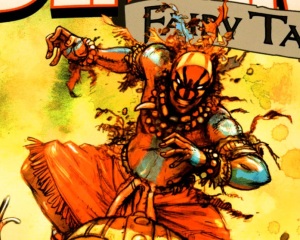Publisher: Marvel Comics
Created by: C.B Cebulski and Niko Henrishon
1st appearance: Spider-man Fairy Tales #2, August 2007
Alias: The god of lies, the god of mischief, Spider god, king of all stories
Nationality: African
Team Affiliations: African gods
Legal Status: Unknown
Weight: 225 lbs Height: 6’1
Eyes: Brown Hair: Black
Relatives: Nyambe (father), Asase-Ya (mother), Avlekete, Erzulie, Faa, Ayaba, Eschu, Gou,Legba, Loko, Ogun, Maou, Zaca, Damballah, Baron Samedi (cousins), Lusa, Orishako, Orunjan, Olokun, Nebaste (uncles), Mawu (aunt), Mmoboro, Onini, Osebo, (brothers), Akonadi (daughter), Buluku(ancestor)
Skills and abilities: Master of unarmed combat, able to use anything as a weapon.
Powers: As an African god he has superhuman strength, speed, agility he can also shoot organic webs from his wrists on a scale far beyond that of Peter Parker/Spider-man. He once conjured a web long enough to allow him to climb into the clouds. He has control of spiders and can weave his webs into many shapes and configurations, including a single rope-like strand to swing from, a net to bind enemies, a simple glob to foul machinery or blind an opponent, a shield, a spherical protection or hemispherical barrier, a club, or a hang-glider wing. Kwaku also has the ability to cling to solid surfaces.
Equipment: He possesses a guard with which he can trap the element of water.
Biography
Kwaku Anansi is an African god Known as the god of lies, the god of mischief, Spider god, king of all stories etc. One day while bored after acquiring great power and legendary status he travelled to the realm of his father Nyambe seeking even more power. After finding his uncle in his father’s stead he was told about the “spider-flower” which would grant him the additional power he needed. Gifting him a water gourd Kwaku descended from the heavens. He ran into a water elemental spirit who he defeated in battle before befriending it. Next he battled a water and earth elemental who he also befriended and they accompanied him on his quest. That night he met a fire elemental before abandoning the four to find the “garden at the end of the world” where the “spider-flower” was kept. Here he was overwhelmed by a powerful spirit which controlled bees. Luckily the elementals who he had befriended came to his aid. After the ordeal he no longer desired the ‘Spider-flower” since the additional power he required comes from the friends he made and those he would make in the future [Spider-man Fairy tales #2].
N.B: Kwaku is the Spider-man of alternate marvel earth called “Earth-7082”.














I have this issue, it was VERY good! I would love to see this character return, I’d actually buy a Marvel Comics with him in it.
I agree Chace! Expect the review sometime later next week! Oh, Kwaku will show up in the Spider-verse series later this year 🙂
My issue with this re-imagining – and really most of all re-imaginings by western artitsts – is that Africa, especially west africa where this piece takes places, is as industrialized as any western country yet the popular portrayal is one of deserts and jungles.
This is really interesting. Do you think Anansi was a conscious inspiration for the original Spiderman creators?
On the character file, he says that Anansi’s nationality is American, when in fact he is African, from the Republic of Ghana, precisely.
Although the original story of the Spider God has been shared with Native Americans, and that data may be somewhat confusing.
But apart from that detail, I think it is a good article.
I think this Spider-Man is one of the most enigmatic, but there is not much information about this character. And it should, because Anansi is not just another Spider-Man, but rather the first and in charge of sharing his spider powers, with everyone else. Ultimately, Kwaku Anansi is the spiritual father of all Spider-People, including the original Spider-Man, from Earth Marvel-616.
(Sorry, the previous comment is in Spanish, I forgot that the page was in English).
My bad…corrected!
yes, of course. This is why we must control our own cultural gifts. When we don’t, this is waht happens. Others make millions from our culture and we wonder why our neighborhoods and communities are so bad.